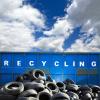
Raw materials for the future
To a circular economy for raw materials
The European Commission has launched a program in 2013, the European Innovation Partnership (EIP) for raw materials, in order to secure Europe's competitiveness in the global market. The goal is to reduce Europe's dependence on imports of raw materials in 2020.
This program is part of the Roadmap to a Resource Efficient Europe in which a dot is put on the horizon for achieving a sustainable European economy: resource efficient and low carbon. An economy based on efficient use of resources and less CO2 emissions. The RecyBEM system's annual 60,000 tonnes less CO2 emissions and is committed to closing the tire chain. With this we connect with the strategy of the European Union towards a sustainable European economy: resource efficient and low carbon.
100% of the natural rubber comes from outside the EU
To strengthen the European industry, it is essential that the industry is able to have access to resources on time and at a reasonable marketprice. A large part of the European industry, including the tyre industry, is highly dependent on international markets for raw materials. The European industry has to import all natural rubber from countries outside the European Union. 100% of the natural rubber that is used in the tyre industry, is from outside the EU.
| Raw material | Dependency on import from outside the EU |
| Natural rubber | 100 % |
| High tech metals | 96% |
| Iron ore | 85% |
| Rare raw materials* | 77% |
| Bulk metal | 57% |
| Industrial minerals | 46% |
| Wood | 15% |
| Paper | 9% |
* Of which the availability is not obvious, such as rare metals.
It is important to recover rubber from discarded materials
It is very important to secure Europe's competitiveness and to reduce dependence on imports of rubber, because Europe is completely dependent on non-European countries for the import of natural rubber. The aim of the EIP for raw materials is to accelerate research, development and innovations in the field of efficiency, substitution, recycling and redesign. An important point of the program is to improve the re-use of materials and the promotion of high quality recycling. Recycling is an important way to reduce Europe’s demand for raw materials from outside the EU. The EIP for raw materials aims to encourage circular economy while preserving raw materials in the supply chain.
RecyBEM is committed to close the tyre chain
RecyBEM encourages the recycling of tyres into granulates and steel, in order to save raw materials for the furture and to reduce CO2 emissions. RecyBEM want to make a step further and aims at closing the tyre chain. In this context RecyBEM supports the development of the process for devulcanization.





